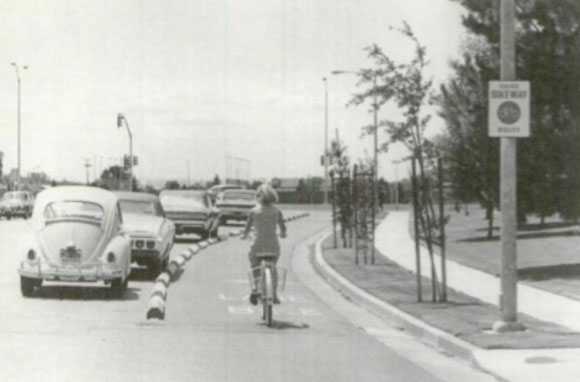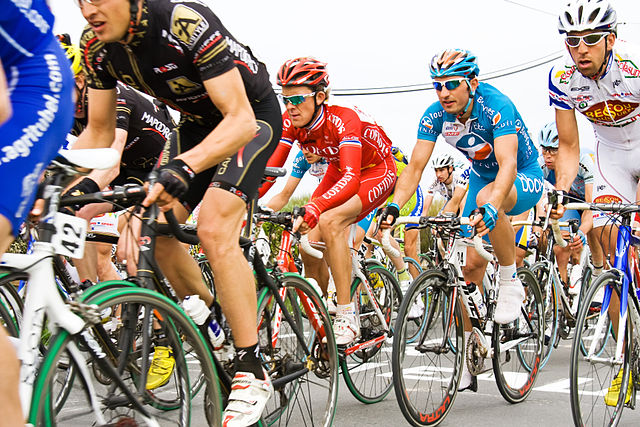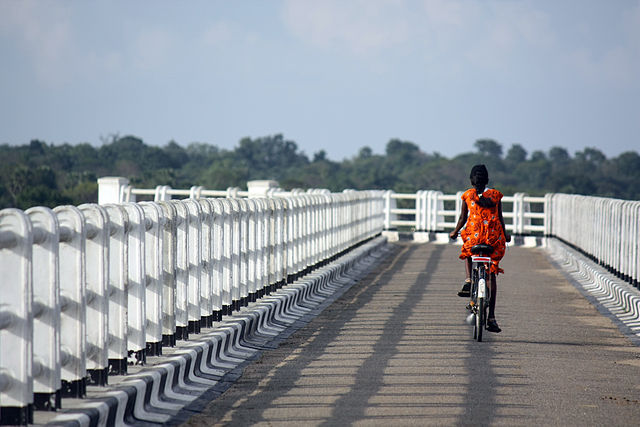
I have a bicycle, which I ride regularly, but I am not a "Cyclist". I have deliberately never learned to drive a motorcar, and yet I am still not a "Cyclist". I am an active member of the LCC, and even so I am not a "Cyclist"!
What am I? Well, that depends a lot on who's asking and why, but in the context of the above the answer is simple: I'm just a person with a bicycle. I'm someone who does not drive a car, and has firm reasons for never doing so. I'm someone who cares about the structure of our built environment, and who has ideas for how roads can be improved in London.
What is a Cyclist?
Of course, by declaring myself not a Cyclist, I'm defining it far less broadly than most. After all, nearly everyone uses the term "cyclist" to refer to everyone on a bicycle. But the term has become evocative of a particular type of person. To sort this out, I take you now to the Wikipedia entry for Cycling, which has this as its first image:

Almost everyone I know finds this image fairly representative of the word "cyclist" to them. It features fit twentysomething men in spandex and plastic hats: a uniform of specialised sportswear. They lean forward to squeeze every ounce of performance out of their spiderweb-light bicycles, showing dedication to their expensive hobby. If these are Cyclists, then it follows that they exhibit these patterns to signal to observers that they are devotees of Cyclism.
But let us now scroll past the off-road sport bicycling and the London cycle police to the fourth image on that Wikipedia page:

Do you imagine this woman identifies herself as a Cyclist? She has almost nothing in common with the men in the previous image, other than that she's riding some sort of bicycle. The demographics, equipment, posture, goals, and setting are so different that I find it absurd to use the same word to describe these two sets of people.
So let the sporty dudebros keep "cyclist". We can let that term die off in association with "lycra louts" as a signifier for obsessed white men with expensive toys. We can say these images all show people on bikes, but beyond that they're almost on separate planets.
What word, then?
To fill in the gap, I take a term from my adopted British homeland: Pootler. The OED defines "pootle" as:
Move or travel in a leisurely manner: 'they were pootling down a canal in their new boat'
The term is often associated with lazy cycling, indicating someone who is trying not to become sweaty. For Cyclists, a good shower is a given after a "tour" by bicycle. But Pootlers are just trying to get to work or go shopping or ferry the kids home or maybe just take in the sights. Pootlers aren't interested in breaking any speed records or beating a taxi to the next stoplight, but in completing a trip safely.
Where does that leave us?
We have this misperception that Cyclism defines the role that the bicycle should take on our roads: it's either a recreational toy, or an opportunity for someone to prove athletic prowess and best the motorcar on its own turf. This poisons the discourse, ignoring the needs of the woman cycling from one village to another as part of her daily business.
Marc Caswell reported on StreetsBlog that plans for surprisingly good protected cycle lanes were drawn up in the US in the late 1960s and early 1970s (one example is pictured at the top of this essay). But when the time came to build them, they were destroyed--not by some Big Oil motoring lobby, but by Cyclists:
Just as the bikeways movement was gaining steam and formalization was taking shape, physically separated bikeways were challenged by a new movement of vehicular cycling advocates — many of whom still challenge bikeways today. Throughout the 1970s, these fit men who self-identified as “cyclists” attended meeting after meeting to decry the designs that engineers were supposedly building for them. Quibbles in the wording of laws or details of a design became arguments and headaches for city staff. Anyone who was not already riding a bicycle on busy car-dominated streets was drowned out by the vehicular cyclists who claimed to speak for all bicycle riders.
If we'd let the same contingent of motorcar drivers define the motoring infrastructure, the result would be absurd: "We could build residential roads with driveways leading up to home garages, but Formula 1 drivers have been shown to prefer pit stop lanes instead."
Design for eight year-old girls, not thirty year-old men.
My Pootler's mantra is "Ride Like a Child!" Even my fellow LCC members have commuted by bike for so long that they have come to accept routes that are only "good enough" because they have a wealth of skill and experience riding alongside London's automotive traffic. While these people are fighting the good fight, they also stop and ask themselves "Would I let my child ride here right now?" and the answer is often a dismayed "Absolutely not!"
To this end I have resisted riding on routes favoured by motorcar traffic. I pootle on calm residential streets, where speeds are low and nobody expects to make it through without a little courteous letting-pass. I am capable of signaling a turn and checking behind me, but any road faster than 20mph without safe protection for me is something to be avoided.
Do you suppose this kid was allowed to cycle along here before the segregation? More of this please. pic.twitter.com/81N5vDbqLp
— aviewoflondon (@sw19cam) July 2, 2015When I "Ride Like a Child", I imagine an eight year-old. This is partly due to inspiration from people I know, but also because eight years old was when I started riding the bus on my own. Think of it not as a particular personality, but as a particular balance of independence and lack of experience. When you advocate some piece of infrastructure for people on bicycles, I ask you to think "would this be safe for eight year-olds to ride?"
While I support the Space for Cycling campaign, I'm hoping for something better. I'm hoping for...